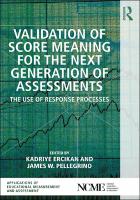Validation of Score Meaning for the Next Generation of Assessments
Proposal review
The Use of Response Processes
| dc.contributor.editor | Ercikan, Kadriye | |
| dc.contributor.editor | Pellegrino, James W. | |
| dc.date.accessioned | 2022-04-26T08:39:42Z | |
| dc.date.available | 2022-04-26T08:39:42Z | |
| dc.date.issued | 2017 | |
| dc.identifier | ONIX_20220426_9781317483342_7 | |
| dc.identifier | OCN: 980303428 | |
| dc.identifier.uri | https://library.oapen.org/handle/20.500.12657/54173 | |
| dc.description.abstract | Despite developments in research and practice on using examinee response process data in assessment design, the use of such data in test validation is rare. Validation of Score Meaning in the Next Generation of Assessments Using Response Processes highlights the importance of validity evidence based on response processes and provides guidance to measurement researchers and practitioners in creating and using such evidence as a regular part of the assessment validation process. Response processes refer to approaches and behaviors of examinees when they interpret assessment situations and formulate and generate solutions as revealed through verbalizations, eye movements, response times, or computer clicks. Such response process data can provide information about the extent to which items and tasks engage examinees in the intended ways. With contributions from the top researchers in the field of assessment, this volume includes chapters that focus on methodological issues and on applications across multiple contexts of assessment interpretation and use. In Part I of this book, contributors discuss the framing of validity as an evidence-based argument for the interpretation of the meaning of test scores, the specifics of different methods of response process data collection and analysis, and the use of response process data relative to issues of validation as highlighted in the joint standards on testing. In Part II, chapter authors offer examples that illustrate the use of response process data in assessment validation. These cases are provided specifically to address issues related to the analysis and interpretation of performance on assessments of complex cognition, assessments designed to inform classroom learning and instruction, and assessments intended for students with varying cultural and linguistic backgrounds. | |
| dc.language | English | |
| dc.subject.classification | thema EDItEUR::J Society and Social Sciences::JN Education::JND Educational systems and structures::JNDH Education: examinations and assessment | en_US |
| dc.subject.classification | thema EDItEUR::J Society and Social Sciences::JM Psychology::JMB Psychological methodology::JMBT Psychological testing and measurement | en_US |
| dc.subject.classification | thema EDItEUR::J Society and Social Sciences::JN Education::JNC Educational psychology | en_US |
| dc.subject.other | Andreas Oranje | |
| dc.subject.other | Applications of Educational Measurement and Assessment | |
| dc.subject.other | Assessment | |
| dc.subject.other | Brian D. Gane | |
| dc.subject.other | Deirdre Kerr | |
| dc.subject.other | Educational Assessment | |
| dc.subject.other | Educational Evaluation | |
| dc.subject.other | Educational Measurement | |
| dc.subject.other | Educational Methodology | |
| dc.subject.other | Ercikan | |
| dc.subject.other | Evaluation | |
| dc.subject.other | Game-Based Assessment | |
| dc.subject.other | Gerald Tindal | |
| dc.subject.other | Guillermo Solano-Flores | |
| dc.subject.other | Isaac I. Bejar | |
| dc.subject.other | Jacqueline P. Leighton | |
| dc.subject.other | James W. Pellegrino | |
| dc.subject.other | Joanna Gorin | |
| dc.subject.other | Joseph F. T. Nese | |
| dc.subject.other | Julie Alonzo | |
| dc.subject.other | Kristen Huff | |
| dc.subject.other | Laura Wright | |
| dc.subject.other | Lauress L. Wise | |
| dc.subject.other | Leilani S | |
| dc.subject.other | Louis V. DiBello | |
| dc.subject.other | Magda Chía | |
| dc.subject.other | Michael Kane | |
| dc.subject.other | NCME | |
| dc.subject.other | Paul Nichols | |
| dc.subject.other | Pellegrino | |
| dc.title | Validation of Score Meaning for the Next Generation of Assessments | |
| dc.title.alternative | The Use of Response Processes | |
| dc.type | book | |
| oapen.identifier.doi | 10.4324/9781315708591 | |
| oapen.relation.isPublishedBy | 7b3c7b10-5b1e-40b3-860e-c6dd5197f0bb | |
| oapen.relation.isbn | 9781317483342 | |
| oapen.relation.isbn | 9781138898370 | |
| oapen.relation.isbn | 9781138898363 | |
| oapen.relation.isbn | 9781315708591 | |
| oapen.imprint | Routledge | |
| oapen.pages | 164 | |
| peerreview.anonymity | Single-anonymised | |
| peerreview.id | bc80075c-96cc-4740-a9f3-a234bc2598f1 | |
| peerreview.open.review | No | |
| peerreview.publish.responsibility | Publisher | |
| peerreview.review.stage | Pre-publication | |
| peerreview.review.type | Proposal | |
| peerreview.reviewer.type | Internal editor | |
| peerreview.reviewer.type | External peer reviewer | |
| peerreview.title | Proposal review | |
| oapen.review.comments | Taylor & Francis open access titles are reviewed as a minimum at proposal stage by at least two external peer reviewers and an internal editor (additional reviews may be sought and additional content reviewed as required). |

